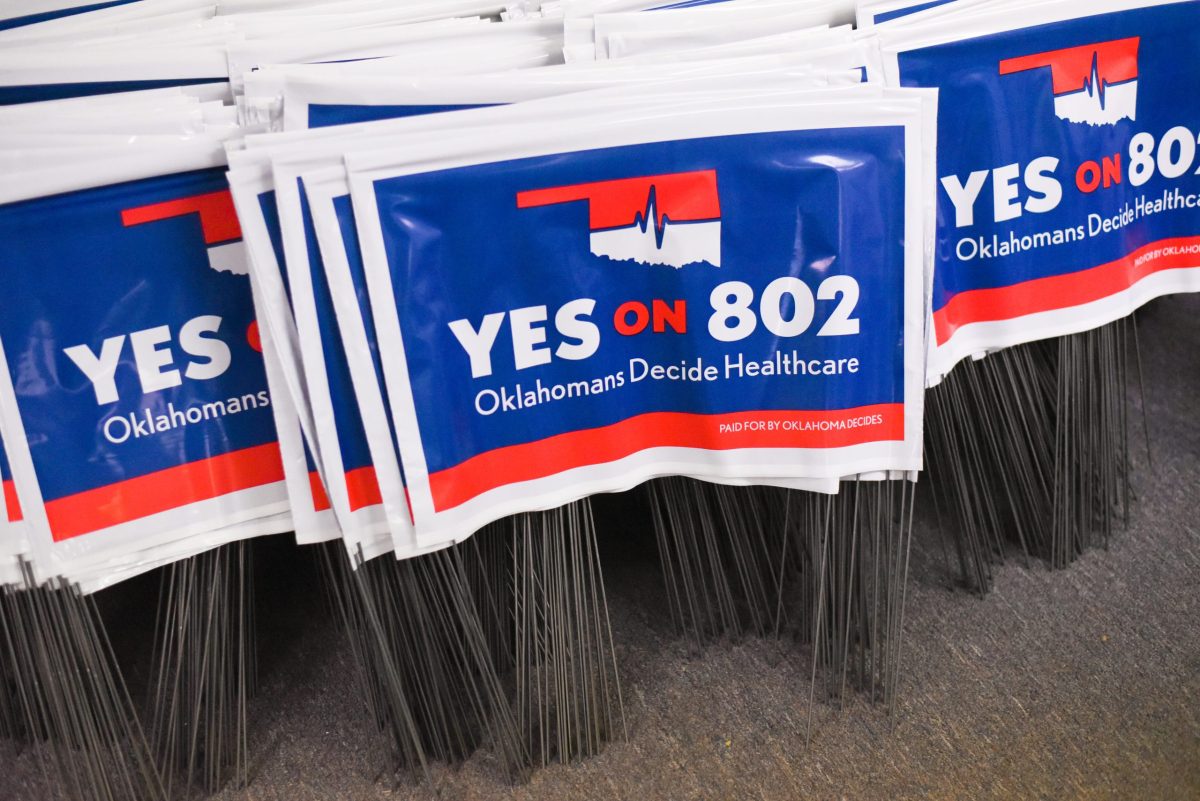Low-Income Adults: Don't Overlook Expanded Medicaid for Health Insurance
Posted on Friday, August 20th, 2021

The People Said YES: Yard signs from the ballot initiative in 2020 that resulted
in Oklahoma residents approving the expansion of Medicaid to cover any low-income adults
ages 19-64. Previously Medicaid, or SoonerCare, was restricted to children
and pregnant women.
Almost Too Good To Be True:
Medicaid Has Expanded To Cover Adults Without Children
For the first time, Oklahoma men and women without child dependents are eligible for Medicaid. It may not have dawned on them yet to look into “Expanded Medicaid,” which started July 1, 2021.
Expanded Medicaid is for any adults aged 19-64 who have yearly income under 138% of poverty. Currently that is $17,774 or less for a single adult or $36,588 or less for a family of four.
Enrollment assistance is available at the Health Department on C.E. Colston St., DHS on Wanda St., and at the Mercy Health/Love County Hospital business office. Or apply online at healthcare.gov or mysoonercare.org, or call the SoonerCare Healthline at 1-800-987-7767.
The newly-enrolled will have health care coverage and be able to seek medical care, with the hospital and other providers receiving compensation from Expanded Medicaid.
Expanded Medicaid, passed by the voters as a Constitutional amendment on June 30, 2020, is expected to reduce Oklahoma’s uninsured rate, which, at 14%, is highest in the U.S. behind only Texas.
Medicaid is a public health insurance program for the poor, with states splitting the cost with the federal government. In Oklahoma, Medicaid is also called SoonerCare.
Adults in Expanded Medicaid can establish a medical home and see a medical provider on a regular basis. They can be covered for six prescriptions per month or obtain benefits for oxygen, wheelchairs, walkers, and hospital beds when a doctor orders them for use in the home.
They can undergo mammograms or other routine screenings. Routine dental care and dental hygiene also are covered. Hospitalization, surgery, mental health care, and substance abuse treatment also are in the plan.
There are no premiums. But non-pregnant adults will be charged copayments of $4 per medical service or prescription, but not more than 5% of the household monthly income for copays.
Who Was Eligible Before Medicaid Expansion?
Before the new plan, Oklahoma’s Medicaid covered only children and pregnant women. About 855,000 individuals – mostly children – were enrolled as of 2020.
The parents of dependent children were eligible for Medicaid only if their annual household income was under 41% of poverty (just over $10,000 for a family of four). Most childless adults were ineligible regardless of income.
Medicaid also had coverage for people age 65, blind, or disabled. Many Medicare beneficiaries receive Medicaid’s help with paying for Medicare premiums, affording prescription drugs, and covering expenses not covered by Medicare – such as long-term care.
About 200,000 adult Oklahomans now qualify for Expanded Medicaid. Independent college students ages 19-22 can enroll on their own income if they are not listed as dependents on their parent’s tax forms. Dependent college students must count their parents’ income.
Children and pregnant women will continue to be eligible for Medicaid at higher income levels (currently those earning $21,950 or less), and nothing is changing about Medicaid eligibility rules or benefits for people age 65 and older.
How Did Expanded Medicaid Happen?
State voters approved Medicaid expansion on June 30, 2020, passing a Constitutional amendment by just over a 6,000-vote margin – less than one full percentage point.
Medicaid Expansion was a key provision of the Affordable Care Act of 2010, but a Supreme Court ruling made it optional and left the decision up to each state. With the vote, Oklahoma became the 37th state to adopt Expanded Medicaid.
As an inducement to expansion, the federal government shoulders 90% of the cost of those newly-covered adults. This is estimated to bring more than $1 billion additional federal funds annually to Oklahoma, creating jobs, protecting rural hospitals, and ensuring that low-income adults have health coverage. The state will have to pick up 10% of the cost for the newly-insured.
The Oklahoma Healthcare Authority has announced that maximizing federal funding will allow the state the added ability to pursue substance abuse disorder and serious mental illness in jails and prisons and to help former inmates apply for SoonerCare coverage upon release, helping them get access to behavioral health services immediately.
States had been eligible to adopt Expanded Medicaid since 2013. By waiting, Oklahoma missed out on $8.6 billion in federal funding between 2013 and 2023.
The state’s Republican-led legislature had declined six annual opportunities to adopt expansion, saying it could end up costing the state money and therefore cut into funding for other government services. A ballot initiative ultimately took the issue directly to the state’s residents, and they approved.